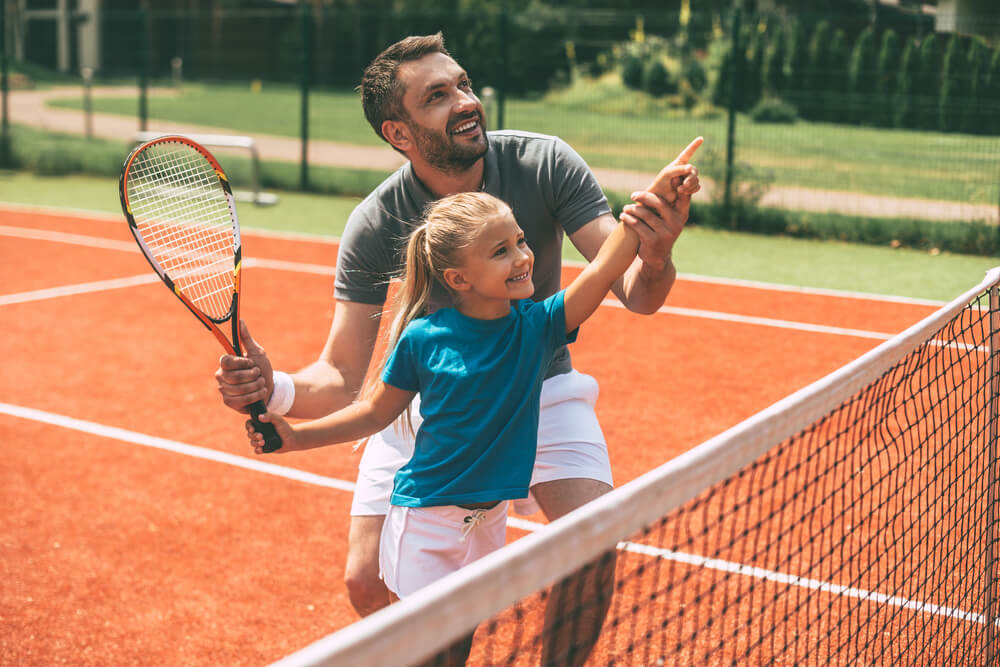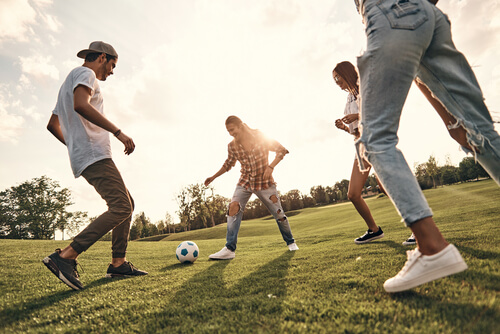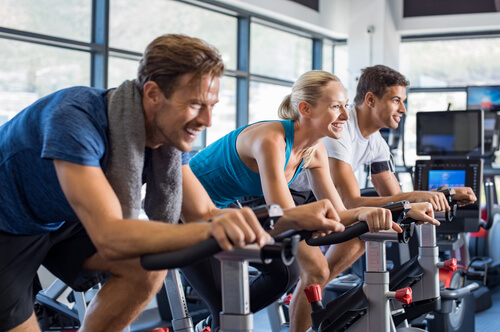
Who doesn’t want to live longer? We all know physical activity and exercise is important to stay healthy, but when it comes to helping us live longer, some sports and activities have a bigger impact than others.
Tennis yields the best results, adding 9.7 years to your expected lifespan on average, at least according to scientists conducting a 25-year study in Denmark.[1] The study provided results for a variety of other sports besides tennis.
| Sport or activity | Added average life expectancy |
| Badminton | 6.2 years |
| Soccer | 4.7 years |
| Cycling | 3.7 years |
| Swimming | 3.4 years |
| Jogging | 3.2 years |
| Callisthenics | 3.1 years |
| Other health club activities | 1.5 years |
| Source: Various Leisure-Time Physical Activities Associated With Widely Divergent Life Expectancies: The Copenhagen Study. Peter Schnohr et al., Mayo Foundation for Medical Education and Research. 2018. | |
An earlier study from 2016 in the British Journal of Sports Medicine found similar results: cycling, swimming, aerobics and racquet sports like tennis and badminton had the most significant impact on life expectancy across various sports and activities.[2]
So, why do these sports help us live longer than others?
Working out as a social event
All physical activity is good for us, as it helps us stay fit and live longer by reducing risk factors such as hypertension, cardiovascular disease and heart attacks, along with helping us feel better and develop stronger joints, muscles and bones.[3]

In regards to the Denmark study, the scientists put forward the idea that bursts of energy may be more effective than long, continuous exercise.[4]
Dr Peter Schnohr and his team of scientists in Denmark, who carried out the 25-year-long study, noticed that the sports with the best-increased life expectancy results, tennis, badminton and soccer, were also social sports played together with others.[5]
Exercising with others can be more enjoyable for friends working out together, and also encourage a little friendly competition that leads to more intense and longer periods of exercise.[6]
The link between the brain and the body
In contrast to sports that are physically intense, incidental physical activity such as walking up flights of stairs, cycling to work, doing grocery shopping or cleaning the house can still be beneficial to our health. A study by the British Journal of Sports Medicine found that the regular activities of the day can make us go through periods of activity of a higher intensity – which is good news for anyone who finds it difficult to fit in gym sessions or time for exercise.[7]
While playing physical sports helps us live longer, playing chess can also have a benefit to our life expectancy by reducing the risk of dementia. The age of death of a number of chess grandmasters was compared to the age of death of Olympic athletes by a team of Australian scientists from the University of Melbourne and the University of Queensland. The result was that grandmasters tend to live longer.[8]
Additionally, a higher intelligence quotient or I.Q. has been shown to reduce the risk of chronic diseases and accidental injuries, and has been linked to longer lifespans.[9]
There is a link between the brain’s health and the body’s physical health. Both need to be exercised to stay fit and healthy if you want to live longer. Mental exercises, thinking games and learning a new skill can also keep the brain sharp and improve our memory as we get older.[10]
So, when picking up a new tennis racquet, it may pay to grab a Sudoku book or chess set for later as well if you’re looking to live longer.
Gym memberships and private health

If getting to live longer and hanging out with friends isn’t quite enough motivation, if you have a private health extras policy you might be eligible for a rebate on gym and exercise class membership fees.
There are gyms and sports facilities across Australia where members can use multiple machines when working out, participate in an exercise class or play racquet sports like tennis or squash. However, different health funds will have different requirements for you to receive a rebate, such as having a health management plan from your GP or attending a gym that is recognised by the health fund.[11]
Be sure to check the wording of your health policy to see what’s covered, or contact your health insurer to see what options may be available.
Sources:
[1] Various Leisure-Time Physical Activities Associated With Widely Divergent Life Expectancies: The Copenhagen City Heart Study. Peter Schnohr et al, Mayo Foundation for Medical Education and Research. 2018.
[2] Associations of specific types of sports and exercise with all-cause and cardiovascular-disease mortality: a cohort study of 80 306 British adults. Pekka Oja et al, British Journal of Sports Medicine. 2016.
[3] Physical activity – it’s important. Better Health Channel, Victoria State Government. 2018.
[4] What sport is best for achieving greater longevity? Skeptical Scalpel, Doctor’s Voice, Physician’s Weekly. 2018.
[5] Various Leisure-Time Physical Activities Associated With Widely Divergent Life Expectancies: The Copenhagen City Heart Study. Peter Schnohr et al, Mayo Foundation for Medical Education and Research. 2018.
[6] Exercising With a Partner Is Better Than Working Out Alone – As Long As Your Workout Companion Is More Fit Than You. Susan Scutti, Medical Daily. 2013.
[7] Don’t have time to exercise? Here’s a regimen everyone can squeeze in. Emmanuel Stamatikis, The Conversation. 2019.
[8] Checkmate: top chess players live longer. Philip Clarke, The Conversation. 2018.
[9] Linda Gottfredson, Ian Deary. 2004. ‘Intelligence Predicts Health and Longevity, but Why?’ Sage Journals. Volume 13, Issue 1, Pages 1-4.
[10] Healthy ageing – stay mentally active. Better Health Channel, Victoria State Government. 2014.
[11] Private health Fund Rebates. Fitness Australia. 2016.







